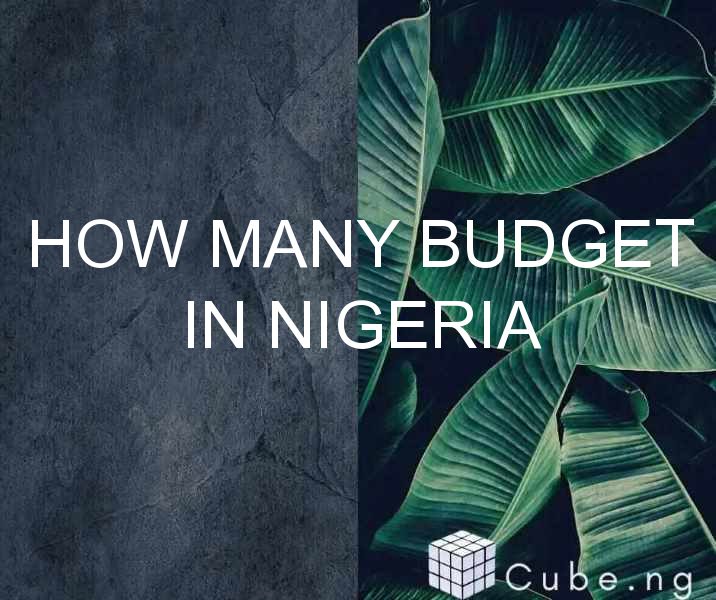Table of Contents
How Many Budgets Does Nigeria Have? Exploring the Country's Financial Landscape
Nigeria is a country with a rich and diverse economy, and the government plays a crucial role in shaping its financial landscape. One of the key tools used by the government to manage the country's finances is the budget. But how many budgets does Nigeria have, and how are they structured? In this article, we will explore these questions and more, providing a comprehensive overview of Nigeria's budgetary system.
What is a budget?
Before we dive into the specifics of Nigeria's budgetary system, let's take a step back and define what a budget is. At its core, a budget is a financial plan that outlines projected income and expenses for a specific period of time. It is a tool used by individuals, businesses, and governments to manage their finances and make informed decisions. In the case of a government, the budget is a reflection of its priorities and policies, and can have a significant impact on the economy and society as a whole.
Nigeria's federal budget
In Nigeria, the federal government is responsible for creating and implementing the national budget. The budget is typically presented to the National Assembly (the country's legislative body) by the President in December of the preceding year, and must be approved by both the Senate and the House of Representatives before it can take effect.
The federal budget is structured into three main components: recurrent expenditure, capital expenditure, and debt service. Recurrent expenditure refers to the day-to-day expenses of running the government, such as salaries, utilities, and maintenance costs. Capital expenditure, on the other hand, is focused on investments in infrastructure and other long-term projects that are intended to stimulate economic growth. Debt service refers to the repayment of loans and other forms of debt.
Nigeria's state budgets
In addition to the federal budget, Nigeria also has budgets at the state level. Each of the country's 36 states (plus the Federal Capital Territory of Abuja) is responsible for creating and implementing its own budget, which is typically presented to the state assembly for approval. The structure of state budgets is similar to that of the federal budget, with recurrent and capital expenditure categories, as well as debt service.
How much money does Nigeria allocate to its budgets?
The amount of money allocated to Nigeria's budgets varies from year to year, depending on a range of factors such as economic conditions, government policies, and international developments. In recent years, the federal government has typically allocated around N8 trillion (approximately $20 billion USD) to its budget, while state budgets vary depending on the size and economic strength of each state.
How is Nigeria's budget funded?
Nigeria's budget is primarily funded through the country's oil and gas revenue. Nigeria is one of the world's largest oil producers, and the export of crude oil accounts for a significant portion of the country's GDP. In addition to oil and gas revenue, the government also generates income from taxes, fees, and other sources.
Challenges facing Nigeria's budgetary system
While Nigeria's budgetary system is designed to promote economic growth and development, it faces a number of challenges that can make it difficult to achieve these goals. One of the biggest challenges is corruption, which can result in funds being misappropriated or diverted away from their intended purposes. Another challenge is the volatility of oil prices, which can have a major impact on the government's ability to fund its budget.
Conclusion
In conclusion, Nigeria's budgetary system is a complex and multifaceted tool for managing the country's finances. With a federal budget, as well as budgets for each of its 36 states, Nigeria's financial landscape is shaped by a range of factors, including oil and gas revenue, taxes, and fees. While the system faces a number of challenges, such as corruption and oil price volatility, it remains a critical tool for promoting economic growth and development in the country.
FAQs
-
How is Nigeria's federal budget created?
The federal budget is typically presented to the National Assembly by the President in December of the preceding year, and must be approved by both the Senate and the House of Representatives. -
What is the structure of Nigeria's state budgets?
State budgets are structured similarly to the federal budget, with recurrent and capital expenditure categories, as well as debt service. -
How much money does Nigeria allocate to its budgets?
The amount of money allocated to Nigeria's budgets varies from year to year, but the federal government typically allocates around N8 trillion to its budget. -
What are the biggest challenges facing Nigeria's budgetary system?
Corruption and oil price volatility are two of the biggest challenges facing Nigeria's budgetary system. -
Why is the budget important for Nigeria's economy?
The budget is a critical tool for managing Nigeria's finances and promoting economic growth and development in the country. It reflects the government's priorities and policies, and can have a significant impact on the economy and society as a whole.




